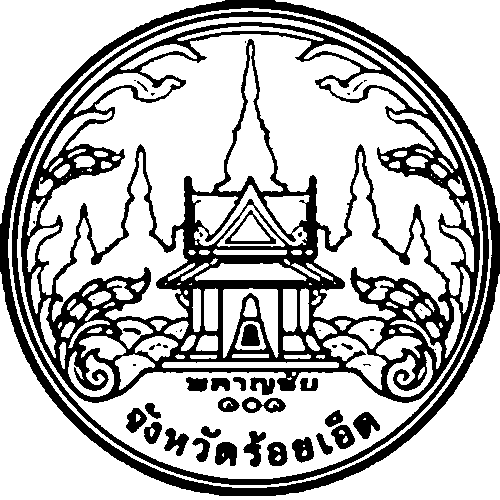Roi Et Province
|
Roi Et ร้อยเอ็ด |
||
|---|---|---|
| Province | ||

Phra Phuttharattanamongkhon Maha Muni or Luang Pho Yai, Wat Burapha Phiram (Wat Hua Ro)
|
||
|
||
 Map of Thailand highlighting Roi Et Province |
||
| Country | Thailand | |
| Capital | Roi Et | |
| Government | ||
| • Governor | Sarit Withun (since October 2016) | |
| Area | ||
| • Total | 8,299.4 km2 (3,204.4 sq mi) | |
| Area rank | Ranked 23rd | |
| Elevation | 150 m (490 ft) | |
| Population (2014) | ||
| • Total | 1,308,318 | |
| • Rank | Ranked 11th | |
| • Density | 160/km2 (410/sq mi) | |
| • Density rank | Ranked 23rd | |
| Time zone | ICT (UTC+7) | |
| ISO 3166 code | TH-45 | |
| Website | http://www.roiet.go.th/2013/ | |
Roi Et (Thai: ร้อยเอ็ด, pronounced [rɔ́ːj ʔèt]) is one of the provinces (changwat) of Thailand, in the northeast of Thailand. Neighboring provinces are (from north clockwise) Kalasin, Mukdahan, Yasothon, Sisaket, Surin, and Maha Sarakham.
The name of the province literally means "one hundred and one" (ร้อยเอ็ด roi et). Correctly, the number should be "eleven" (สิบเอ็ด sip et), as the province was named after its eleven ancient gates built for its eleven vassal states. In olden times, the number "eleven" was written "๑๐๑" (101) and the province name was so written. Later, people misunderstood that "๑๐๑" was "one hundred and one" and have since incorrectly called it Roi Et.
Most of the province is covered by plains about 130–160 meters above sea level, drained by the Chi River. In the north are the hills of the Phu Phan mountain range. The Yang River is the major watercourse. In the south is the Mun River, which also forms the boundary with Surin. At the mouth of the Chi River, where it enters the Mun River, a floodplain provides a good rice farming area.
The area was already settled at the time of the Khmer empire, as several ruins show. However, the main history of the province began when Lao people from Champasak settled near Suwannaphum during the Ayutthaya Kingdom. In the late 18th century, King Taksin moved the city to its present site, then called Saket Nakhon.
...
Wikipedia

